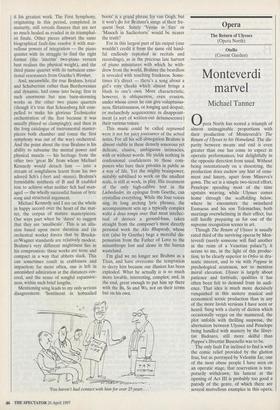ARTS
Love abideth foremost
Robin Holloway says he took a long, devious route before reaching a fair view of Brahms Brahms's reputation is so secure as not to need the factitious advantage of an anniversary. Moreover, unlike Schubert, Bach, Mozart, his oeuvre on the whole lacks nooks and crannies of fascinating unfamil- iarity: only a handful of choral works and a majority of songs and partsongs remain rel- atively neglected. But he still has his sur- prises, and is certainly great enough to merit a second tribute in this month of the centenary of his death, especially since the angle is largely different.
Though like Michael Kennedy (Arts, 22 March) I too took a long, devious route to reach anything like a fair view. As an enthusiastic teenager drunk on Debussy, Mahler and modernism, the classics seemed simply boring. As teens turned to twenties, they marched in in full regimen- tals, followed by the metal-clad romantic heavies, Bruckner and Wagner. Brahms had no place with either; he fell between the intellectual energy, social grace, physi- cal vitality of classical Vienna, and the mythological-heroic sublimity and sheer sonorous magnificence of his contempo- raries. He appeared merely stodgy, muscle- bound, without wit, brio or charm; sentimental in expression when not, uncon- vincingly, uplifting. To the stiff priggish Leavisite that I was, wholesale appropriation of Nietzsche's gibes — 'he cannot exult'; he reveals 'the melancholy of impotence' — was all too easy. And I recall a spasm of genuine prud- ishness when first hearing the celebrated `Four Serious Songs', the master's penulti- mate opus. The first three seemed dull brown as usual, but the last was positively offensive. It sets the famous passage from I Corinthians xiii. First comes plenty of beefy 20-fingered piano-writing, rendering tongues of men and angels, sounding brass and tinkling cymbal (etc.) with singular ineptness. Then when apostle and compos- er see through a glass darkly, looking for- ward to full face-to-face knowledge, the speed and mood change completely: over gentle piano ripples the voice swells out into a waltz-melody whose character oleaginous yet beery — becomes more and more pronounced, culminating in a saucy little barmaid twiddle in the final phrase. After briefly returning to full speed to set up the three cardinal virtues, Love (Chari- ty) is awarded the palm to a return of the slow waltz, piano now crooning along with voice, oozing with unction — 'the Grease of God'.
The callow ear, attuned to the neon-lit alienation of Mahler and Strauss's pur- poseful vulgarity, missed out on the tone of this typical passage of Brahms (written when both his juniors were getting into
Mary Evans Picture Library
Johannes Brahms their stride). For him, strains of salon and beer-hall can express exaltation, idealism, piety, absolutely without irony. As the jon- gleur juggles before the Virgin because it's what he does naturally and best, so Brahms hymns Love in a waltz. He'd long before bound them together in two sets of Liebeslieder-Waltzes, composed for draw- ing-room pleasure and set (with one excep- tion) to vers-de-societe of amorous triviality. As an ex-chorister, I should have trusted appetite and scorned supercilious superior- ity. Like most cathedral choirs, mine did a few numbers from the master's German Requiem, unsuitably masquerading as Anglican anthems. All three were keenly relished, and they all contain waltzes. One, `How Lovely Is Thy Dwelling-Place', could go alongside the Liebeslieder in style (though of course longer, more various and elaborated). It portrays the delights of the celestial mansions with unabashed worldli- ness — one seems to tread on carpets, sit on sofas, glance through the potted palms at Johann Strauss and his band — though strenuous counterpoint cannot be kept out of the middle section.
In the other two the waltz-nature is not explicit. Indeed, 'Behold All Flesh' is no dance, but a funeral march in triple-time. Yet a lilt gets in at the sighing figures later accompanying the words 'and lo, the grass withereth, and the flower thereof fadeth'. The central section, concerning the patient husbandman, is a gentler, subliminal Liebeslied-waltz. And then, after the march's full-scale return, the Lord's word blows away soldier-trudge or ballroom-lilt in a vigorous common-time fugue. But they return when the Last Trump sounds, again in triple-time after a spooky march Mere on earth have we no abiding place'). It cer- tainly doesn't sound like a waltz to start with, nor yet for 'Death where is thy sting?'; but when it reaches 'Hell, where is thy victory?' there's a hoofy lurch to the triple-time that brings connotations of rus- tic rather than urban dance-floors.
All this is by way of indicating that Brahms, though one of the safest pillars of concert-life, is by no means set in stone. Michael Kennedy is right to say 'routine Brahms is somehow worse than routine anybody else' (possibly routine Verdi, or a routine Swan Lake, can be worse still). The thick veil of classical sobriety and emotion- al reserve conceals some surprises. It is, of course, a metaphor: the disguising beard (actually grown quite late in life), the cigar, the coarseness, the brusque ill-humour with which he fended off interference and, pos- sibly, the urges of Eros: in musical terms the muscular effortfulness, the uncon- cealed cerebration, the Old Masterishness. Beneath all this beats a maiden's tender heart, a vulnerable openness to feeling that, so often thwarted, dignifies without hardening over the decades into autumnal stoicism which, disdaining equally the con- solations of religion and the high-noon apotheosis of Wagnerian redemption-by- love, can yet declare to strains of sublimat- ed beer-hall that, of the three virtues, Love abideth foremost.
Paradoxically it was when young in years, and fully beardless, that his composition was most heaven-storming. One pities the audience, the piano and the pianist, when the three early sonatas are undertaken, let alone the colossal first concerto. But there is a magnificent bravado to the ambition here that later retreats as if it had singed its hands; and, in the concerto at least, the themes and their deployment are so inspired that what for Michael Kennedy is ham-tragedy inclines me sometimes to call it his greatest work. The First Symphony, originating in this period, completed in maturity, still reveals fissures that are not so much healed as evaded in its triumphal- ist finale. Other pieces athwart the same biographical fault-line resolve it with mar- vellous powers of integration — the piano quintet with its struggle to find the right format (the 'interim' two-piano version best realises the physical weight), and the third piano quartet with its turbulent emo- tional resonances from Goethe's Werther.
And, meanwhile, the true Brahms, lyrical and Schubertian rather than Beethovenian and dynamic, had come into being; first in such enormous but non barn-storming works as the other two piano quartets (though it's true that Schoenberg felt com- pelled to make his glorious Technicolor orchestration of the first because it was usually played so clumpingly); and then in the long catalogue of instrumental master- pieces both chamber and (once the first symphony was out of the way) orchestral. And the point about the true Brahms is his ability to subsume the mental power and physical muscle — his heritage from the other two 'great Bs' from whom Michael Kennedy would detach him — into a stream of songfulness learnt from his two adored Sch's (-bert and -mann). Brahms's formidable synthesis of B and B enabled him to achieve what neither Sch had man- aged — the wholly successful fusion of lyric song and structural argument.
Michael Kennedy and I are on the whole in happy accord over the heart of the mat- ter, the corpus of mature masterpieces. Our ways part when he 'dares' to suggest that they are `smallscale'. This is an allu- sion based upon mere duration and (in orchestral works) forces that by Bruckn- er/Wagner standards are relatively modest. Brahms's very different mightiness lies in his compression: these works are terse and compact in a way that abhors slack. This can sometimes result in crabbiness and impaction; far more often, one is left in astonished admiration at the distances cov- ered, and the sense of songful expansive- ness, within such brief lengths.
Mentioning song leads to my only serious disagreement. 'Sentiment in hobnailed boots' is a grand phrase for van Gogh, but it won't do for Brahms's songs at their fre- quent best. Surely 'Venus in furs' or `Masoch in Sachertorte' would be nearer the truth?
For in this largest part of his output (one wouldn't credit it from the same old hand- ful endlessly repeated in recitals and recordings), as in the precious late harvest of piano miniatures with which he with- drew from the world, Brahms the beardless is revealed with touching frankness. Some- times it's direct — there's a song about a girl's rosy cheeks which almost brings a blush to one's own. More characteristic, however, is obliqueness, even evasion, under whose cover he can give voluptuous- ness, flirtatiousness, or longing and despair, or melancholy acquiescence in disappoint- ment (a sort of written-out detumescence) their various voices.
This music could be called repressed were it not for juicy jouissance of the actual notes. For all his self-abnegation Brahms is almost visible in these densely sonorous yet delicate, elusive, ambiguous intimacies, with or without words. He yields nothing in confessional confidences to those com- posers who bare their privates in public as a way of life. Yet the mighty brainpower, suitably subtilised to work on the smallest scale, is still at work, in play. His treatment of the only high-calibre text in the Liebeslieder, its epilogue from Goethe, can crystallise everything. While the four voices sing its long arching lyric phrases, the accompaniment sets up a typically complex waltz a deux temps over that most intellec- tual of devices a ground-bass, taken straight from the composer's most directly personal work the Alto Rhapsody, whose text (also by Goethe) begs a merciful dis- pensation from the Father of Love to the misanthrope lost and alone in the barren wasteland.
I'm glad we no longer see Brahms as a Titan, and have overcome the temptation to decry him because our illusion has been exploded. What he actually is is so much more lovable, interesting, complex; and, in the end, great enough to put him up there with the Bs, Ss and Ws, not on their terms but on his own.
`You haven't had contact with him for over 25 years . .



































































 Previous page
Previous page